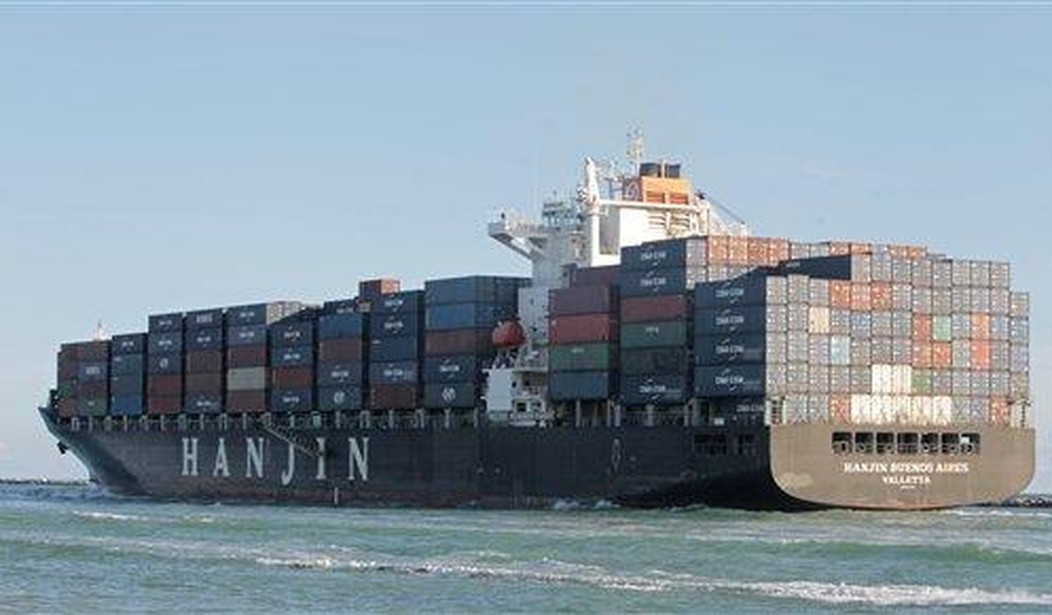After a recent hurricane, Puerto Ricans desperately needed fuel.
Fortunately, an oil tanker was right offshore.
Unfortunately, the United States government forbade it to come ashore!
Why?
Because of a stupid law with a stupid name: The Jones Act.
The Jones Act forbids shipping anything between American ports in ships that are not U.S. built and crewed. This makes goods cost more (the average Hawaii family must pay $1,800 more a year) and sometimes, as happened in Puerto Rico, makes a crisis worse.
Yet America's shipping lobby claims this law is a good thing.
"The Jones Act ensures reliable, dedicated service," says American Maritime Partnership's Jennifer Carpenter in my new video. Her group lobbies for shipowners and labor unions.
"Your rules really hurt people!" I push back obnoxiously, flatly accusing her of sleazy manipulation, "You give money to politicians; they ban your competition."
She smiles and says, "The Jones Act is a time-tested American security law, so we are not at the mercy of foreign powers."
That's nonsense. The act has nothing to do with American security.
Foreign ships deliver goods to America from foreign powers all the time. That includes ships from China and Russia. Dozens of foreign vessels are in American harbors right now.
It's only within America that foreign shipping is banned. Only American ships and crews are allowed to move goods from Los Angeles to Hawaii, or from Miami to Puerto Rico.
The Jones Act is just another a special deal that one industry has scammed out of Congress.
Recommended
Banning foreign ships didn't even do good things for America's shipbuilding industry. With competition outlawed, they got fat and lazy.
There were once more than 450 American shipyards. Now there are only 150. The number of American-crewed ships has dropped, too.
"Because of your monopoly," I say to Carpenter, "American shipyards keep closing. They don't have any competition, so they don't improve."
"Competition within our industry and with other modes of transportation is vigorous!" she replies. "It's dog eat dog."
"No, it's not!" I reply. "The best dogs are banned."
She pivots quickly. "The U.S government does not subsidize U.S. shipyards the way many of our strategic competitors and allies do."
That's true, and pathetic. Subsidies are destructive. It's good that America subsidizes less than other countries.
Anyway, Cato Institute trade policy specialist Scott Lincicome points out that American ships cost much more than the subsidy difference, "four to five times more to build than ships in Japan or Korea," mostly because of "decades of being protected from competition, simply not having to innovate."
Today no American shipyard builds even one ship that can carry natural gas. That's a big problem for New England if we have a cold winter. Eversource president Joseph Nolan worried there wouldn't be enough gas for the winter because he couldn't "get relief from the Jones Act." No wonder New Hampshire Gov. Chris Sununu calls the act an "antiquated 100-year-old union driven policy."
Carpenter lobbies against Jones Act waivers.
"You give politicians money not to grant waivers," I tell her.
"Hold up!" she exclaims. "Let's unpack this. Frankly, waivers should be safe, legal and rare. What we too often see is somebody's trying to make a quick buck. There's no national defense need; there's no shortage of product. It's, 'Hey, I could save some money.'"
But saving money is good for consumers! It's good for everyone but America's shipping monopoly.
Of course, most industries don't want competition! American carmakers didn't want to compete with Honda and Toyota. But they got better because they had to compete.
"Just like foreign competition improved American automobiles," says Lincicome, "foreign competition would do the same for American-made ships."
We'd all be better off if America's shipping industry had to compete like every other business.
The Jones Act should die.

























Join the conversation as a VIP Member